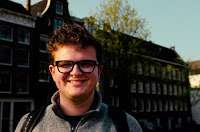I am Clayton Mansel, and This is How I Work
 Today, I am interviewing Clayton Mansel, an undergraduate student in molecular biology, in the “How I Work” series. Next summer, he plans to apply to MD/PhD programs and pursue a career as a pediatric neurologist. He’s also a writer at student-scientist.com where he writes about the tools he uses, his experience as a budding scientist, and science in general. In his free time, Clayton enjoys reading, photography, and playing the french horn.
Today, I am interviewing Clayton Mansel, an undergraduate student in molecular biology, in the “How I Work” series. Next summer, he plans to apply to MD/PhD programs and pursue a career as a pediatric neurologist. He’s also a writer at student-scientist.com where he writes about the tools he uses, his experience as a budding scientist, and science in general. In his free time, Clayton enjoys reading, photography, and playing the french horn.
Current Job: Student
Current Location: Kansas City, MO
Current mobile device: iPhone 7
Current computer: MacBook Pro 13 inch
Can you briefly explain your current situation and research to us?
I go to school at a small liberal arts college where I have the opportunity to lead research projects on my own. In the lab, I study the molecular mechanisms of tributyltin-mediated neurodegeneration in mouse enteric neurons.
What tools, apps and software are essential to your workflow?
There are so many! On my Mac, I use DEVONthink as an ‘everything bucket’ where I store all types of files and organize them using folders and tags. My favorite feature is that it automatically makes every PDF (e.g., research articles) fully searchable and uses AI to categorize and contextualize them. For writing papers, MindNode 6 is my must-have app where I take notes, organize my thoughts, and build a mind map for my paper. For collaboration, Notion has proven to be crucial to my lab’s workflow as we organize our tasks and lab calendar.
What is your best advice for productive academic work?
Find long chunks of time for focus without distractions. For me, it usually takes 30 min without distractions before I even begin to be productive and do meaningful work. Cal Newport wrote about this in his book ‘Deep Work’.
How do you keep an overview of projects and tasks?
I use Things 3 to organize my tasks and projects. But often I will also just write a little ‘hit list’ at the end of the day on sticky note and stick it to my computer monitor to remind me of my next steps the next day. For long term goals and my mission/values, I use Notion which gives me a blank slate to think carefully about what I am doing and where I am going.
Besides phone and computer, do you use other technological tools in work and daily life?
I use an iPad Pro that my school gives every student. I really enjoy it for taking digital notes and reading/marking up PDFs. I also use apps like Concepts which provides an infinite canvas—great for brainstorming. I think the iPad is a great companion device for students, but still not as important as a phone and computer.
Which skill makes you stand out as an academic?
My ability to use technology to make myself more efficient and effective. I have learned over the years how to make technology work for me, not against me, and that is something that has differentiated myself as an academic. As one example, I took the time to learn every feature in Apple’s excellent Keynote (like powerpoint) application, and now when I do presentations, people are always impressed and engaged and ask me how I made certain elements. When it comes to technology, I am usually one step ahead of everyone. (Unfortunately, I can’t say the same about math and statistics!)
What are you currently reading? How do you find time for reading?
I am currently reading ‘Economics for the Common Good’ by Nobel Prize winner Jean Tirole. To find the time, I use a Kindle and the Kindle app because I believe it greatly reduces the friction to reading. With the Kindle, I can highlight and take notes and purchase and download new books in seconds. I put the Kindle app on the home screen of my iPhone, and whenever I have a few minutes, I’ll just pull out whichever book I’m reading and my progress is automatically synced across devices. One of my favorite facts is that reading just 30 minutes a day equates to over 1,000 books read in an average person’s lifetime—I want to die having read 1,000 books!
What’s the best advice you ever received?
I don’t know about best ever received, but advice that has really helped me this summer was ‘you can’t do anything wrong’. This advice has really given me the confidence to try new things at the bench and take risks in my research. Mistakes are completely fine and pave the way to success.
